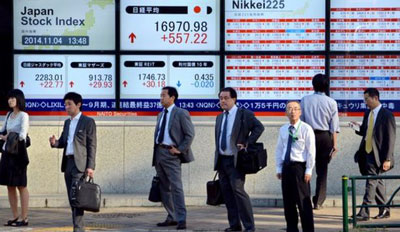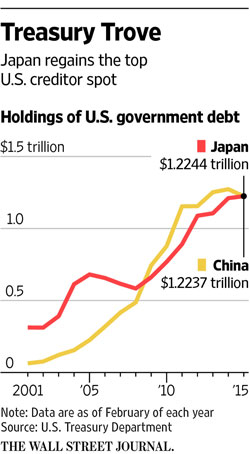Japan Overtakes China as Largest U.S. Bondholder

Japanese become biggest funders of American government for first time since 2008 financial crisis
Japan dethroned China as the top foreign holder of U.S. Treasurys for the first time since the financial crisis, following a wave of purchases by buyers shifting money to the U.S. as Japan’s economic policies push down interest rates there.
In reclaiming its status as the largest foreign creditor to America in U.S. official data, Japan is reasserting itself as Beijing holds its Treasury portfolio steady amid a weakening Chinese economy.
U.S. debt bears higher yields than government bonds offered in other rich nations, thanks to the perception of stronger U.S. growth prospects and to central-bank bond purchases that have driven yields near zero across Europe and in Japan.
Private investors and official institutions in Japan owned $1.2244 trillion of U.S. government securities at the end of February, compared with $1.2386 trillion at the end of January, according to the latest monthly data released by the Treasury on Wednesday.

China held $1.2237 trillion of Treasury debt at the end of February, compared with $1.2391 trillion a month earlier.
Over the past year, Japan has boosted its holdings by a net $13.6 billion, while China’s holdings dropped by $49.2 billion.
The Treasury data, released with a two-month lag, don’t capture all of the Treasury-bond holdings China may have parked at middlemen in places such as the U.K. and Belgium. Many analysts and investors believe China has considerable holdings bought through such intermediaries. The Treasury notes on its website that “it is difficult to draw precise conclusions about changes in the foreign holdings of U.S. financial assets by individual countries” from the capital-flow data.
The Japanese purchases have helped drive long-term U.S. bond yields near record lows despite an economic expansion that averaged 2.7% annually over 2013-14. Those low yields have, in turn, helped keep down interest rates for Americans on everything from home loans to credit cards.
The shift also reflects changes sweeping China. The world’s most-populous nation has in recent months largely held its Treasury portfolio in place, reflecting a slowdown in the growth of its $3.73 trillion foreign-exchange reserve, the world’s largest, and an effort to shift those reserves toward higher-yielding assets such as foreign corporate bonds, equities and real estate.
Japanese individuals and institutions are buying Treasurys at a rapid clip. Japanese investors bought a net ¥2.6 trillion ($21.8 billion) of foreign bonds in March, following over ¥1.3 trillion of net purchases in February, according to J.P. Morgan Chase & Co.
Japan’s $1.1 trillion Government Pension Investment Fund, the world’s largest pension fund, last October raised its allocation to foreign bonds to 15% from 11%, in part reflecting the ultralow yields available on Japanese debt. The 10-year Japanese government bond yielded 0.322% Wednesday, compared with 1.900% on the comparable U.S. Treasury note.
Yuichi Onsen, chief strategist and general manager in the global fixed-income investment department of T&D Asset Management Co., has been telling institutional clients for the past two years they should buy Treasurys and move away from Japanese government bonds because the Bank of Japan’s policies to juice its economy that were adopted in 2013 would likely push down yields.
“We’ll continue to buy Treasurys, maybe more if [U.S.] yields go up,” said Mr. Onsen. The firm has ¥1.74 trillion in assets under management.
The single largest holder of U.S. long-term debt is the Federal Reserve, with more than $2 trillion. The amount has surged from $755 billion at the end of 2007, fueled by Fed purchases of long-term securities in response to the financial crisis.
Japan’s purchases will help soothe lingering concerns that U.S. bond prices could decline as China slows its buying.
“China is currently the 800-pound gorilla in the U.S. Treasury market,’’ said James Sarni,a managing principal at investment manager Payden & Rygel, which oversees $90 billion of assets. “However, it is not the only gorilla in the jungle.”
Investors have fretted over a possible bond-market reversal for years, “but guess what: There has always been a willing buyer,” said David Ader, head of government-bond strategy at CRT Capital Group LLC.
The U.S. market remains key to how China allocates its foreign-exchange reserves, advisers to the central bank say, especially in light of a strengthening dollar that is expected to make it more attractive for Beijing to invest in dollar assets.
In addition to Japanese and Chinese buying, analysts say demand from Europe has been rising amid tumbling yields there. The 10-year German government-bond yield fell to a record closing low of 0.102% Wednesday.
Source: WSJ – Japan Overtakes China as Largest U.S. Bondholder




























